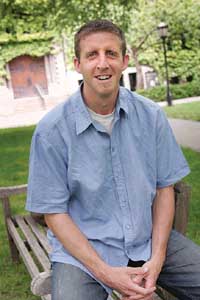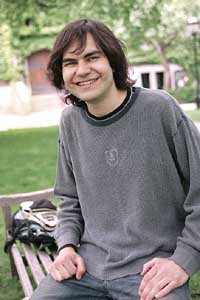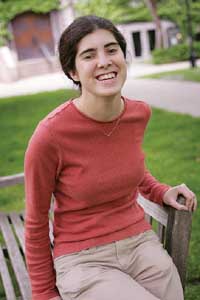The Wayne C. Booth Graduate Student Prize for Excellence in Teaching
By Josh SchonwaldNews Office
Two graduate students and a recent Chicago Ph.D. have been awarded the Wayne C. Booth Graduate Student Prize for Excellence in Undergraduate Teaching. The prize was established in 1991 in honor of Wayne C. Booth, the George M. Pullman Distinguished Service Professor in English Language & Literature and the College. Students and faculty members submit nominations, and the winners each receive a $2,000 cash award.
The awards parallel the Llewellyn John and Harriet Manchester Quantrell Awards for Excellence in Undergraduate Teaching, which recognize distinguished teachers on the faculty.
Adam Davis
 Adam Davis | |
Adam Davis’ goal is not to provide his students with answers.
Instead, he aims to “raise questions, make students aware that there are questions. Make them aware that questions exist that they didn’t even know existed,” said Davis, a Ph.D. from the Committee on Social Thought, who is this year’s winner of the Social Sciences Division Booth Prize.
For the past several years, Davis, whose dissertation focused on the political philosophy of Jean Jacques Rousseau, has taught in the Classics of Social and Political Thought sequence in the Social Sciences Core.
Davis, who has taught in each of the three parts of the sequence, is blunt about his teaching style. “I don’t do anything that is particularly novel.” But what he does do is improvise. Davis tries to read the “energy” of the classroom. “If the class has vitality, I’ll try to manage and encourage that energy,” he said, “but if I feel that the class lacks vitality, I’ll acknowledge it. Is there a problem with the content? What’s the source? I’ll ask the question directly.”
At Chicago, Davis has taught some of Aristophanes and Aristotle to Hobbes, Locke and Machiavelli. Among these texts, Davis said his favorites to teach are Rousseau’s Second Discourse (“it’s beautifully written and provocative”) and Plato’s Republic. The Republic is particularly ideal, Davis said, “because it models the kind of discussion that I seek to create.”
A graduate of Kenyon College and Boston College, where he holds an M.A. in Political Science, Davis has an unusually diverse range of teaching experience—he’s taught poetry and philosophy at the Camp of Dreams, a summer camp for underserved pre-teens, for the past two summers. And he has taught the philosophy of social justice to AmeriCorps participants for the past three years.
Davis enjoys teaching, in myriad contexts, and said he is more interested in pursuing the teaching aspect of academia than scholarly work.
But no matter what the teaching context, he said, his goal remains the same: “I want to raise questions.”
Marc Djaballah
 Marc Djaballah | |
Teaching philosophy has always been a problem for philosophers, said Marc Djaballah. “How can you teach someone something that they don’t already know? It’s always been a problem. And the difficulty is especially apparent with philosophy, which involves a process of integration into a completely different cast of thought.”
But as difficult of a philosophical challenge as teaching philosophy may be, Djaballah, a Philosophy Ph.D. student for six years who has taught at Chicago for the past four years, loves the practice. In fact, Djaballah, who also teaches regularly on the Faculté de Theologie Evangelique at Acadia University in Quebec, finds that getting paid to teach—and receiving an award for teaching—is, he said, “staggering. I feel like I’m getting away with theft when they actually pay me to teach.”
A Montreal native who graduated from McGill University, Djaballah focuses his own research and teaching on a problem in German and French philosophy at the end of the 18th century. In recent years, however, his interest has increasingly focused on aesthetics, such as film, music and literary criticism.
Teaching philosophy has its challenges, Djaballah emphasized. Satisfaction or achievement is far from instant. “Genuine and valuable insight seems to take a while to percolate,” he said. And the practice requires what Djaballah describes as a “readiness to think about things in other ways and for one’s own part. As a teacher, in this context there’s really nothing you can do other than bridge some of the gap between pre-philosophical experience and philosophical thinking by attending to the transitional rough spots with an alert, pragmatic sensitivity.”
Margaret Hershberger
 Margaret Hershberger | |
In her first year at Chicago and after her very first teaching experience here, Margaret Hershberger, a Chemistry Ph.D. student, was awarded a Booth Prize. A first-time teaching assistant in honors general chemistry, Hershberger supervised a lab and conducted a weekly discussion as a companion to classes taught by David Maziotti, Assistant Professor in Chemistry, and Rustem Ismagilov, Assistant Professor in Chemistry.
Though it was Hershberger’s first time in a Chicago classroom—and her first chance to explain challenging topics such as quantum mechanics, spectroscopy and thermodynamics—she is not a complete neophyte in teaching chemistry. The daughter of two chemistry professors at Miami University (Ohio) and a chemistry student at Ohio State University, Hershberger said she has observed good and bad teachers and has tried to emulate the best.
Honors general chemistry has a tightly structured curriculum, she said, with a lot of material to cover rapidly. Because of the time demands, Hershberger often had to lecture to get through all the material. But she also is very happy, when time permits, to have a question and answer format. One of her chief goals as a teaching assistant is to foster excitement about chemistry.
“I’m excited about chemistry, and I try to excite my students. I was fortunate to have a very bright, very creative group of students to work with.” Hershberger, whose own research focuses on ultrafaspectroscopy, a technique in which short pulses of light are used to study molecules, likes to talk about her own research with students. “I’ve tried to make things happening in the world outside of the class known to them.”
But for Hershberger herself, one of the most satisfying experiences of the past year was the world inside the classroom. As a teaching assistant, she sat in on the lectures of Mazzioti and Ismagilov, covering material she had learned as a first-year at Ohio State University. But relearning the material proved especially enlightening, she said.
“It was great hearing how they explain material I’d learned before,” Hershberger said. “It really broadened my vision.”
![[Chronicle]](/images/sidebar_header_oct06.gif)